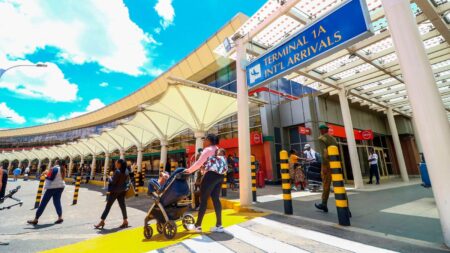Nine out of ten (87 per cent) of Kenyans are dissatisfied with the country’s direction on economic management, a survey has revealed, casting doubt on governments’ commitment to deliver on its promises.
The proportion of citizens who express dissatisfaction, according to a report released in Nairobi this week, has been increasing since 2016 when five out of ten citizens (53%) were unhappy.
Citizens are equally dissatisfied with the country’s direction on job creation (82 per cent) which again is higher compared to the past years, since 2016, when half of citizens (51%) were unhappy.
This is despite the Economic Survey 2019 by the Kenya National Bureau of Statistics (KNBS)-released in April-indicating the economy grew by 6.3 per cent in 2018 compared to 4.9 per cent in 2017, creating 840,600 new jobs.
READ:How Kenya managed to grow its economy by 6.3%
Corruption is one of the major concerns by majority of Kenyans where more than half of citizens (54%) are unhappy with management of the vice. This is up from 23 per cent in 2017 and 25 per cent in 2018.
READ:What is hurting manufacturing in Kenya
However, a majority of Kenyans (62%) are satisfied with the country’s progress in security matters.
These findings were released by Twaweza in a research brief titled The Big Four Agenda: Kenyans’ views on current public policy issues. The brief is based on data from Sauti za Wananchi, Africa’s first nationally representative high‐frequency mobile phone survey.
Big four
Majority of Kenyans see corruption to be the biggest impediment to the governments’ achievement of its Big Four Agenda and its promises to the people.
The Big Four entails food security, growth of the manufacturing sector, universal healthcare and affordable housing.
READ:Corruption threat to my “Big Four Agenda” President Kenyatta warns
“Despite some positive indications in citizens’ views about corruption management, eight out of ten Kenyans (77 per cent) cite corruption as the main reason why the government’s agenda may not succeed,” explains Mr.Victor Rateng, Senior Program Officer, Sauti za Wananchi.
Though several arrests have been made on suspected corrupt persons, including government officials, Rateng no major prosecutions have been witnessed.
Kenyans have also heard of billions of shillings being lost but are yet to know or hear how much has been returned.
Other factors that are likely to affect the Big Four are politics (13 per cent) and bureaucracy five per cent. Nonetheless, 14 per cent of Kenyans say that nothing will derail the agenda.
“Citizens have other important views for the government to take into account as it is implementing this agenda. On the social and affordable housing initiative, Kenyans largely believe that it should benefit all Kenyans (48%) or more specifically the poor (28%),” the report notes.
A sizeable proportion also think that the initiative should benefit the urban poor (20 per cent).
However, when asked who they think will actually benefit, views are varied where for instance, two out of 10 (18 per cent ) think all Kenyans will benefit and four out of 10 (38 per cent) think the urban poor will benefit most.
“This view may reflect the fact that housing shortages and challenges are generally more acute in urban areas. However two out of 10 citizens, nineteen per cent, say that politicians, civil servants and the rich will benefit, which is again in some ways linked to perceptions about corruption,” Rateng notes.
READ ALSO:Corruption: Is Kenyatta’s affordable housing plan another looting scheme?
In terms of food security, citizens are keen for the government to reduce the cost of food (40 per cent) or to lower the cost of farm inputs and use local fertilisers (40%).
The share of people who provide more specific suggestions around farming is similar to that of those who make their primary living from crop farming (33%). Citizens also have other interesting ideas to consider such as enhancing large scale production, and using idle arable land (23 per cent); incentivizing the use of technology to reduce post‐harvest losses (19%) and forming a working group to coordinate irrigation (18%).
Citizens also see agriculture as the main opportunity for enhancing manufacturing in their area where six out of ten citizens (63%) see this as the sector for developing and enhancing manufacturing.
READ:Kenyan President Uhuru Kenyatta Tackling Food Insecurity as part of his Big Four Plan
The cost of living has been on the rise since January with inflation hitting 6.58 per cent in April, up from 4.35 per cent in March, the highest increase in 19 months.
This was occasioned by among others, the high cost of food prices on delayed rainfalls and the rising fuel prices as a result of higher global prices and cost of importing.
On universal health care, more than half of citizens (58%) are strongly in support of increasing productivity and reducing costs in the National Hospital Insurance Fund (NHIF) in order for it to reach more people and function better.
Other ideas include increasing the number of agents (31%), increasing the number of household volunteers who recruit people (20%), and increased funding to the ministry or NHIF (12%).
“The central message of these findings is that citizens have the information, ideas and experience to contribute usefully to critical current policy debates. Government should listen to these ideas for a number of reasons: citizens will feel as if they have been listened to; they have experience on the front lines of many of the big four issues; and because the agenda will be more likely to succeed with citizen participation,” Rateng said.
“Using these insights and initiating a broad program of citizen consultations will surely enhance the plans for and implementation of the Big Four Agenda,” he added.
President Uhuru Kenyatta’s Big Four agenda is focused on raising the manufacturing sector’s contribution to GDP from 8.5 per cent to 15 per cent, unveiling 500,000 affordable homes, universal healthcare in the country and ensuring no Kenyan goes hungry(food security).
2019 Outlook
The KNBS has noted that performance of Kenya’s economy looks less optimistic in 2019 on account of a number of factors among them the delayed long rains with most parts of the country set to experience depressed rainfall, while a number of others may record almost long rains failure.
“If this materializes, direct negative impacts will be felt within the activities of agriculture, electricity and water supply sectors. Further impacts could be experienced in industries that have strong interlinkages with these sectors,” KNBS notes in its Economic Survey.
However, activities of the tourism sector are likely to remain vibrant supported by strong expansion in tourists’ arrivals.
The construction industry on the other hand is expected to follow the current trend given the ongoing infrastructural development by the government as well as the prevailing private sector confidence
Inflation is however likely to rise significantly, largely driven by increase in food prices as a result of constrained domestic production in 2019.
This could worsen if the magnitude of the expected rise in fuel prices ends up being substantial. The Kenyan Shilling exchange rate against major trading currencies is expected to remain stable supported by diaspora remittances and a significant level of reserves.
On the demand side, growth is likely to be driven by both the public consumption as well as private sector investment. Public consumption is projected to be underpinned by the ongoing development in infrastructure.
Private consumption might not expand as rapidly as that of public, but is likely to remain robust in 2019 and therefore supportive of growth, while business confidence should remain strong enough to back up expansion in investment.
Exports are likely to be constrained by a subdued external demand against a background of a slowdown in global trade. Overall, the economic growth is likely to slow down, but key macroeconomic indicators are likely to remain within desirable ranges throughout 2019.











